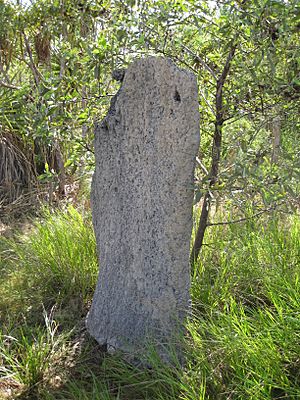Magnetic termite facts for kids
Quick facts for kids Amitermes meridionalis |
|
|---|---|
 |
|
| Mound of the magnetic termite | |
| Scientific classification | |
| Kingdom: | |
| Phylum: | |
| Class: | |
| Order: | |
| Infraorder: | |
| Family: |
Termitidae
|
| Subfamily: |
Amitermitinae
|
| Genus: |
Amitermes
|
| Species: |
A. meridionalis
|
| Binomial name | |
| Amitermes meridionalis Froggatt
|
|
The Amitermes meridionalis, often called the magnetic termite or compass termite, is a special kind of insect. These termites live in large groups, like a big family, which scientists call "eusocial." They belong to the Termitidae family.
You can only find these termites in northern Australia. They get their cool names because their unique, wedge-shaped homes always point north and south, just like a compass!
Contents
Discovering the Magnetic Termite
What Do They Look Like?
A single magnetic termite mound can be home to up to a million termites! Each mound is a giant nest for a whole colony of Amitermes meridionalis. Inside, you'll find the queen, king, and many different types of termites like reproductives, soldiers, and workers.
The outside of their mound is super tough and strong. But inside, the walls between their rooms and tunnels are much softer, almost like paper. The soldier termites, who protect the colony, are about 4 to 6 millimeters long. They have curved jaws called mandibles, each with a sharp, inward-pointing tooth.
Many termites never leave their safe home. Because they are so protected inside the mound, they have thin skin, no color, and don't see very well. They also aren't very good at defending themselves outside the nest.
Where Do They Live?
Magnetic termites live in the northern part of the Northern Territory in Australia, especially around Darwin. You can spot their flat, slab-like mounds in grassy areas that often get flooded during the rainy season.
Sometimes, these mounds are spread out far apart. Other times, they can be grouped together, looking a bit like a graveyard of termite homes!
How Magnetic Termites Live
Building Amazing Mounds
The mounds built by these termites are truly incredible. They can reach up to 4 meters (about 13 feet) tall! They are also about 2.5 meters wide and 1 meter deep. These nests are flattened on the sides and are built in a special way.
They are oriented so that the sun warms their eastern and western sides in the morning and evening. But during the hottest part of the day, at midday, less of the mound faces the sun. This smart design helps the nest avoid getting too hot. Inside the mound, the temperature stays pretty steady, and it's always nice and humid.
Life in the Mound
During the summer, when the land floods, the termites stay safe and dry inside their mounds. They eat the food they've stored away. When the dry season comes and the water goes away, the surrounding grass starts to dry out. The termites then collect this dry grass and other plant bits. They store it like hay in special rooms inside their mound.
Magnetic termites mostly eat grass and other plants. Because of this, they don't usually cause problems for people's crops or buildings.

